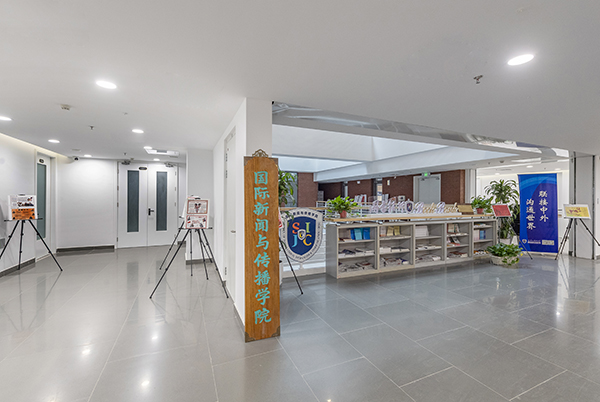- Research
- Research Centers
- Journals
- Admission
- Introduction
- Programs
- Application
- Alumni & Giving
- Alumni Club
- Giving

The origins of the School of International Journalism and Communication of Beijing Foreign Studies University can be traced back to 1981, when three graduates joined China Daily to participate in its establishment, becoming the earliest pioneers of the development of the discipline at BFSU.
In 1985, BFSU established the International Journalism major and officially set up the Department of International Journalism and Communication in 2001. Its undergraduate program in Journalism was approved as a featured program by the Ministry of Education in 2009 and the department was approved to establish a Master's program in Journalism and Communication as a first-level discipline in 2010. In 2014, the School of International Journalism and Communication at BFSU was officially established.
The school adheres to the guiding philosophy of "bridging China and the world", inheriting the tradition of foreign language journalism and communication education at BFSU. With the goal of cultivating multilingual, interdisciplinary and multimedia-savvy high-end talents, the school innovates on and integrates educational models from both Chinese and Western cultures, focusing on nurturing cross-cultural communication leaders who possess profound Chinese insights, global perspectives and humanistic qualities.
In 2015, the school established a doctoral program in the secondary discipline of International Communication. In 2018, the school was approved for a Master's program in Journalism and Communication, as well as undergraduate majors in Communication, Journalism (Japanese language), and International Journalism and Communication. The Journalism major was selected as one of the first national-level first-class undergraduate program construction sites. The school once again became a training unit for the International Journalism and Communication Master's Program (International Communication Class) under the State Council Information Office and the Ministry of Education.
The school hosted the "Multilingual International Communication Experimental Class" project for Xinhua News Agency, and introduced a fully English-language Master's Program in Communication Studies (Global Communication direction).
Furthermore, the school initiated the Education Alliance of Multilingual International Communication and has since held six consecutive sessions of the International Journalism and Communication Education Forum and nine sessions of the China Cross-cultural Communication Forum. It established the international communication branch of the China Education Association for International Exchange while launching the English journal Journal of Transcultural Communication.
In 2025, the school established the Department of Press and Publication, the Department of Communication, as well as the Department of International Journalism and Communication. Additionally, it has set up research and teaching offices for theoretical courses, professional foreign languages and skills courses, research methods and content courses, as well as practical courses.
After more than 40 years of exploration and accumulation, the School of International Journalism and Communication at BFSU has built a comprehensive education system for its bachelor's, master's, and doctoral degrees, as well as an academic research platform in journalism and international communication. The school is guided by disciplines such as global communication history, global communication practices and management, multimedia journalism, as well as intercultural communication. Aligned with national strategies and objectives related to the university's development, the school constantly keeps abreast of the evolving landscape of communication studies and information communication technologies on a global scale. It has established a vibrant and unified center for disciplinary advancement and talent cultivation, dedicated to fostering the distinct Chinese essence within journalism and communication, especially in the realm of international journalism and communication research.
The school boasts a high-caliber faculty team that is cross-lingual, cross-cultural, and interdisciplinary, consisting of full-time teachers, chair professors, postdoctoral researchers, and industrial mentors. As of June 2025, the school has 37 full-time teachers, with 59 percent holding high-grade professional titles, including 14 professors and 11 doctoral supervisors. Among them, 25 teachers have had overseas studying experiences at foreign education institutions, accounting for 68 percent of the total. And 75 percent of the teachers are proficient in teaching professional courses in English, with the English-speaking courses ranking among the top in the field of journalism and communication in domestic universities.
Among the teachers, there is one candidate for the national Hundred-Thousand-Ten Thousand Talents Program, one young top talent selected for the National Ten Thousand Talent Program, three outstanding talents recognized by the Ministry of Education's New Century Talents Program, one selected for Beijing's "Four Batches" Talent Program in the publicity and cultural system, one of the top 100 theoretic talents in China's broadcasting and television industry, around 10 talents selected through the mutual appointment program between the State Council Information Office and the Ministry of Education, as well as two winners of the China Journalism Award.
The school has made significant achievements in research areas such as intercultural communication theory, international communication theory, international communication history, transnational journalism history, and international communication practices. Faculty members and students of the school have published over 1,000 academic papers in domestic and international journals, authored over 100 monographs, textbooks, translated works, and essay collections, and have been granted more than 40 national, provincial, ministerial, and other research projects.
Committed to serving the country's development strategy, the school leverages the multilingual teaching advantages of BFSU, focuses on the foundational task of cultivating students' moral character, and has nurtured a large number of multilingual, versatile, multimedia, and cross-cultural international journalism and communication talents. These promising communication practitioners have a resonating sense of patriotism, are familiar with China's national conditions, and understand the rules of international journalism and communication.
International news communicators travel around the world, using their professional skills to tell Chinese stories globally, making the voice of China heard in the world and building bridges that connect families, nations and the world through a clear and melodious narrative.